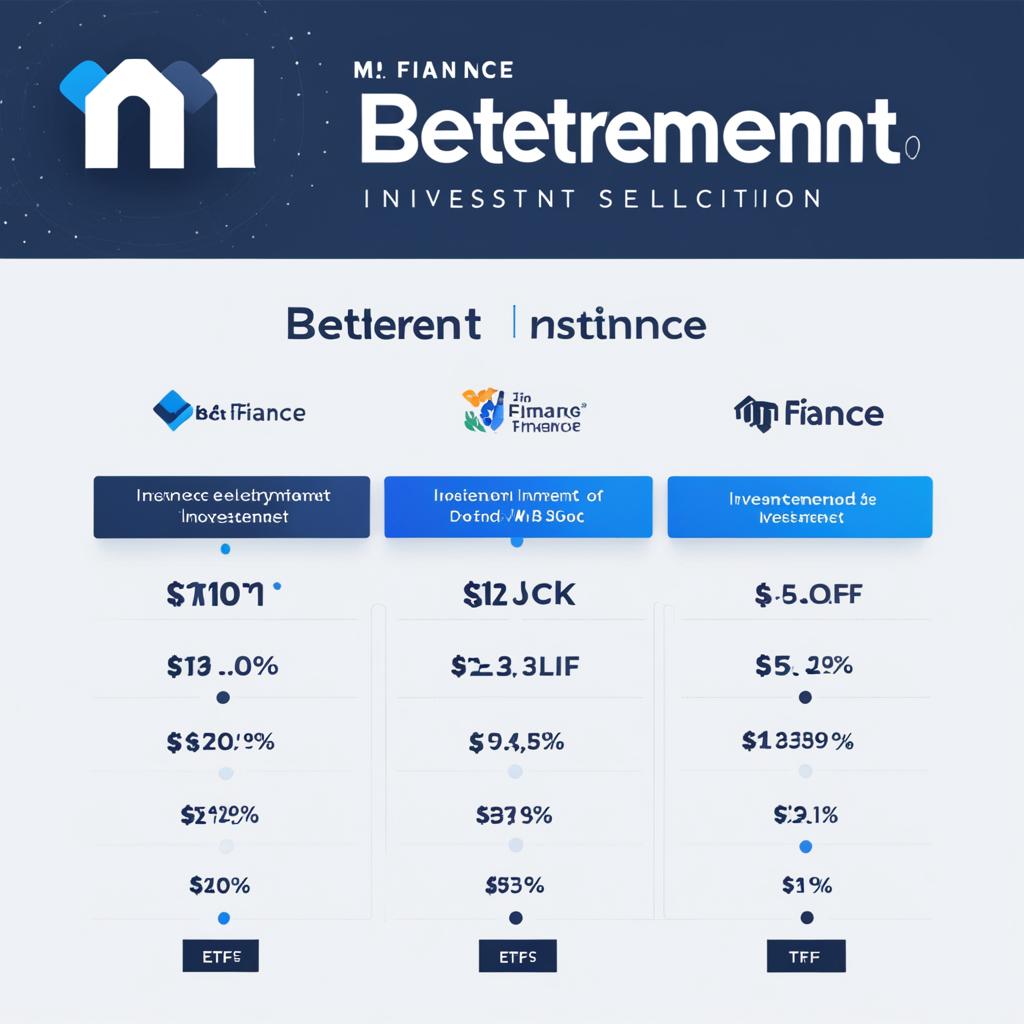When it comes to investing in today’s digital age, two platforms stand out: M1 Finance and Betterment. As robo-advisors, they offer innovative solutions for individuals looking to grow their wealth. While both platforms have their unique features and benefits, it’s important to compare them to determine which one is the best fit for your investment needs.
Let’s delve into a comprehensive comparison of M1 Finance and Betterment, analyzing everything from their features and fees to investment options and user experience. By the end of this article, you’ll have a clear understanding of which platform aligns better with your financial goals.
Key Takeaways:
- M1 Finance and Betterment are leading digital investment advisors with distinct differences.
- Betterment is ideal for beginners, offering index fund investment, rebalancing, and tax-loss harvesting.
- M1 Finance excels in low costs, socially responsible investing, and customization for sophisticated investors.
- Both platforms provide various account types to meet the diverse needs of investors.
- When it comes to goal planning, Betterment offers robust tools, while M1 Finance focuses on a wide range of investment options.
Account Setup Comparison
Setting up an account with both M1 Finance and Betterment is a simple and user-friendly process. However, there are some key differences in the account setup experience between these two platforms.
M1 Finance
With M1 Finance, the account setup is quick and efficient. To get started, users simply need to create a username and password. There is no initial questionnaire to complete, making the process even smoother. M1 Finance caters to users with investor knowledge who want more control over their portfolio selection.
During the account setup, M1 Finance offers users the option to choose from prebuilt investment portfolios or build their own. This flexibility allows users to customize their investment strategy based on their unique preferences and goals.
Betterment
Betterment’s account setup process involves a few additional steps. Users will need to create a login, provide personal details, and go through an initial questionnaire. This questionnaire helps Betterment assess the user’s risk tolerance and investment goals. Based on the responses, Betterment provides a personalized asset allocation, ensuring that the user’s portfolio aligns with their objectives.
Betterment’s account setup approach is ideal for beginners who may not have investor knowledge and prefer a guided experience. The initial questionnaire helps users set up their investment portfolio without the need for extensive financial expertise.
Account Setup Comparison
Here’s a breakdown of the key differences in the account setup process between M1 Finance and Betterment:
| Platform | Account Setup Process | Target Audience |
|---|---|---|
| M1 Finance | Quick and efficient setup process No initial questionnaire required Option to choose prebuilt portfolios or build your own |
Users with investor knowledge Desire for more control over portfolio selection |
| Betterment | Login creation Personal details and initial questionnaire Personalized asset allocation based on responses |
Beginners and users without investor knowledge Prefer a guided investment experience |
When it comes to account setup, both M1 Finance and Betterment offer intuitive processes that cater to different investor preferences. Consider your level of investor knowledge and desire for portfolio control when choosing between these platforms.
Account Types Available
When it comes to account types, both M1 Finance and Betterment offer a diverse range of options to cater to the unique needs of investors.
Betterment provides several account types, including individual taxable accounts, IRAs (Traditional, Roth, SEP, and rollover), joint taxable accounts, trusts, and 529 plans. This wide selection allows investors to choose the account that best aligns with their financial goals and tax strategies.
M1 Finance, on the other hand, offers similar account types as Betterment, but also extends its offerings to include custodial accounts and high-interest checking accounts. Custodial accounts, in particular, make M1 Finance the preferred choice for parents who wish to open accounts for their children. This feature sets M1 Finance apart from Betterment and provides a valuable opportunity for families to start building a strong financial foundation.
To summarize, the account types offered by M1 Finance and Betterment cover the spectrum of investor needs. While Betterment offers a comprehensive range of traditional account types, M1 Finance goes a step further by including custodial accounts, making it a top choice for families.
Account Types Comparison Table
| Account Types | M1 Finance | Betterment |
|---|---|---|
| Individual Taxable | ✓ | ✓ |
| IRA (Traditional, Roth, SEP, rollover) | ✓ | ✓ |
| Joint Taxable | ✓ | ✓ |
| Trust | ✓ | ✓ |
| Custodial | ✓ | – |
| High-Interest Checking | ✓ | – |
Please note that M1 Finance offers additional account types not available on Betterment, such as custodial accounts and high-interest checking accounts. Betterment, however, provides a wide range of traditional account types, giving investors the flexibility to choose the account that best suits their needs. With their extensive account offerings, both M1 Finance and Betterment ensure that investors have access to the account types necessary for their financial journey.
Account Services Comparison
When it comes to account services, both M1 Finance and Betterment offer a range of features to enhance the investor experience. Let’s take a closer look at what each platform has to offer.
M1 Finance Account Services
With M1 Finance, investors can enjoy convenient account services that make managing their finances effortless. Here are some key features:
- Auto Deposits: M1 Finance allows you to set up automatic deposits, making it easy to save and invest regularly.
- Free Withdrawals: You can make withdrawals from your M1 Finance account without incurring any fees.
- Cash Management: M1 Finance offers M1 Spend, a cash management account that includes a checking account and a debit card, providing you with seamless cash management options.
- M1 Borrow: If you need to access funds, M1 Finance offers M1 Borrow, allowing you to borrow against your portfolio.
Betterment Account Services
Betterment also provides a range of account services designed to simplify your financial journey. Here’s what you can expect:
- Auto Deposits: Similar to M1 Finance, Betterment enables you to set up automated deposits to help you grow your investments.
- Free Withdrawals: Betterment allows you to make withdrawals from your account at no additional cost.
- Cash Management: Betterment offers cash management services with two cash accounts: Cash Reserve and checking accounts. These accounts provide you with options for automatic funds transfers and ATM access.
- Premium Level: Both M1 Finance and Betterment have premium levels that offer additional services for an extra fee. Betterment’s premium level provides users with unlimited access to certified financial planners.
It’s worth noting that while both platforms offer similar account services such as auto deposits and free withdrawals, M1 Finance provides additional cash management options through M1 Spend, giving you more flexibility in managing your finances. On the other hand, Betterment’s premium level offers access to certified financial planners, providing personalized guidance for your investment journey.
Overall, whether you choose M1 Finance or Betterment, you can expect a user-friendly experience with a range of account services to meet your needs.
Goal Planning Comparison
When it comes to goal planning, both M1 Finance and Betterment offer distinct approaches. Betterment takes the lead in this area, providing a comprehensive goal planning system that allows users to set multiple goals with separate asset allocations for each goal.
With Betterment’s Goal Forecaster tool, users can easily track their progress and make necessary adjustments to their portfolios. The tool provides valuable insights to help investors stay on track and achieve their financial goals.
Betterment’s goal planning features have been designed to empower users by providing them with a clear roadmap. By allowing users to assign specific asset allocations to each goal, Betterment ensures that their investment strategies align with their unique financial objectives.”
On the other hand, M1 Finance places greater emphasis on flexible goal-setting. Unlike Betterment, M1 Finance assumes that users can handle goal planning on their own. The platform offers a wide range of prebuilt portfolios and investment options, allowing users to tailor their investments according to their individual goals and risk tolerance.
The investment portfolio design process on M1 Finance is visually engaging and user-friendly. With the platform’s intuitive interface, users can easily design and customize their investment portfolios to align with their specific investment goals and strategies.
Overall, Betterment’s goal planning tools and structured approach make it a suitable choice for investors looking for comprehensive guidance. Whereas M1 Finance offers more flexibility and freedom for users to design and manage their investment portfolios according to their own preferences and goals.
Goal Planning Comparison Table
| Feature | Betterment | M1 Finance |
|---|---|---|
| Multiple Goal Setting | ✓ | – |
| Separate Asset Allocations | ✓ | – |
| Goal Forecaster Tool | ✓ | – |
| Flexibility in Goal-Setting | – | ✓ |
| Visually Design Investment Portfolios | – | ✓ |
| Options for Different Investment Strategies | – | ✓ |
Robo Advisor Experience Comparison
When it comes to the robo advisor experience, both M1 Finance and Betterment offer user-friendly platforms that cater to different investing styles. Let’s take a closer look at what each platform brings to the table.
M1 Finance: Customizable and Active Investing
- M1 Finance stands out for its robust customization options, allowing investors to choose from thousands of stocks and ETFs to build their portfolios.
- The platform’s intuitive interface makes it easy for users to design their investment strategies and actively manage their portfolios.
- With M1 Finance, you have the flexibility to select individual securities and create your own investment “pies” tailored to your unique goals and preferences.
Betterment: Passive Investing with Pre-made Portfolios
- Betterment, on the other hand, specializes in passive investing, offering pre-made portfolios based on your risk tolerance.
- The platform’s algorithm automatically rebalances your portfolio to maintain the desired asset allocation.
- By taking a hands-off approach, Betterment simplifies the investment process for those who prefer a more automated experience.
| M1 Finance | Betterment | |
|---|---|---|
| Platform Structure | Customizable portfolios with thousands of stocks and ETFs to choose from | Pre-made portfolios based on risk tolerance |
| Trading Experience | Active investing with the ability to select individual securities | Passive investing with automated portfolio rebalancing |
Both M1 Finance and Betterment offer different account levels with varying features and fees to meet the needs of investors. In addition to investment services, M1 Finance also provides banking services through M1 Spend, while Betterment offers access to certified financial planners for an additional fee.
Ultimately, the choice between M1 Finance and Betterment depends on your investing style and preferences. If you prefer a more hands-on approach and want greater control over your portfolio, M1 Finance’s customizable platform may be the better fit. On the other hand, if you prefer a more automated and passive investing experience, Betterment’s pre-made portfolios may be more suitable.
Fees and Account Minimums Comparison
When it comes to fees and account minimums, M1 Finance and Betterment have unique offerings that cater to different investor preferences. Understanding these differences can help you choose the platform that best aligns with your financial goals and budget.
M1 Finance: No-Cost Management and M1 Plus
One of the standout features of M1 Finance is its no-cost management option. This means that investors can access the platform’s robust investment tools and services without paying any management fees. This is particularly attractive for cost-conscious investors looking to minimize their expenses and maximize their returns.
Additionally, M1 Finance offers a premium account level called M1 Plus. For a monthly fee, M1 Plus members gain access to exclusive benefits such as lower borrowing rates, cashback rewards, and increased trading power.
Betterment: Tiered Fee Structure
Betterment’s fee structure operates on a tiered system based on the total account balance. At the lowest tier, accounts with balances under $100,000 are charged a management fee of 0.25%. As the account balance increases, the fee percentage gradually decreases, with the highest tier at $2 million or more charged a management fee of 0.40%. While this fee structure may be higher compared to M1 Finance’s no-cost management option, it’s important to consider the additional services and features that Betterment provides.
Both M1 Finance and Betterment have no account minimums, meaning you can start investing with any amount. This accessibility makes it easier for investors to get started and grow their portfolios over time.
| Platform | Management Fees | Account Minimums |
|---|---|---|
| M1 Finance | No-cost management | No minimum |
| Betterment | Tiered fee structure (0.25% – 0.40%) | No minimum |
Investment Selection Comparison
When it comes to investment selection, both M1 Finance and Betterment offer a wide array of options to cater to diverse investor preferences. Let’s take a closer look at their offerings:
M1 Finance
M1 Finance provides a robust platform with thousands of stocks and ETFs to choose from, giving investors ample opportunity for customization and active investing. Whether you’re looking to invest in specific companies or track broader market trends, M1 Finance has a comprehensive selection to meet your needs.
“With M1 Finance, you can easily build your own investment portfolio tailored to your individual preferences and goals. From blue-chip stocks to niche ETFs, the platform offers a vast range of choices.”
In addition to individual stocks and ETFs, M1 Finance also offers pre-made investment portfolios, known as “pies.” These pre-built portfolios are designed to align with specific investment strategies or themes, providing a convenient option for users who prefer a ready-made approach.
Furthermore, M1 Finance is committed to socially responsible investing, allowing users to invest in companies that align with their values. Whether you prioritize environmental sustainability or ethical business practices, M1 Finance offers socially responsible investment options to support your financial goals while making a positive impact.
Betterment
While M1 Finance focuses on a broader selection, Betterment takes a more streamlined approach by focusing primarily on ETFs. Betterment offers pre-made portfolios that are based on your risk tolerance and investment goals, making it easier for beginners to get started.
For those who prefer a hands-off approach to investing, Betterment’s pre-made portfolios provide a simplified and diversified investment solution.
“Betterment simplifies the investment process by offering pre-made portfolios tailored to your risk tolerance. Whether you’re conservative or aggressive, Betterment has a portfolio to match your comfort level.”
Like M1 Finance, Betterment also offers socially responsible investing options, allowing investors to align their portfolios with their values. This ensures that your investments not only generate returns but also reflect your commitment to environmental and social causes.
Whether you prefer a wider selection of stocks and ETFs or a more simplified approach with pre-made portfolios, both M1 Finance and Betterment have investment options to suit your needs.

Investment Management Comparison
When it comes to investment management, Betterment and M1 Finance take different approaches.
Betterment: Betterment follows an index fund investment approach, focusing on rebalancing and tax-loss harvesting to optimize returns. By maintaining a balanced portfolio and strategically harvesting tax losses, Betterment aims to maximize investment performance. In addition, Betterment offers the option to access certified financial planners for personalized guidance, helping investors make informed decisions about their portfolios.
M1 Finance: M1 Finance empowers users to take a more active role in managing their investments. With a robust set of tools, M1 Finance allows investors to build and customize their portfolios according to their preferences. While M1 Finance doesn’t offer tax-loss harvesting or access to financial advisors, it provides features for portfolio rebalancing, enabling users to maintain their desired asset allocation over time.
Both Betterment and M1 Finance offer valuable solutions for investment management. Betterment’s hands-on approach with index fund investment, rebalancing, and tax-loss harvesting suits investors who prefer a more passive strategy. On the other hand, M1 Finance appeals to knowledgeable investors seeking control and customization in their investment decisions.
Ultimately, the choice between Betterment and M1 Finance for investment management depends on an individual’s investment goals, risk tolerance, and preferred level of involvement in managing their investments.
Key Features:
- Betterment follows an index fund investment approach, focusing on rebalancing and tax-loss harvesting.
- M1 Finance allows users to build and customize their portfolios.
- Betterment offers access to certified financial planners for additional guidance.
- M1 Finance provides tools for portfolio rebalancing.
Investment Management Comparison Table:
| Features | Betterment | M1 Finance |
|---|---|---|
| Investment Approach | Index fund investment with rebalancing and tax-loss harvesting | User-customized portfolios with rebalancing |
| Access to Financial Advisors | Unlimited access for an additional fee | N/A |
| Portfolio Rebalancing | Automated portfolio rebalancing | Tools for portfolio rebalancing |
| Tax-Loss Harvesting | Offers tax-loss harvesting | N/A |
Investors should carefully consider their investment objectives, risk tolerance, and evaluate any fees and expenses associated with the investment before making a decision. The information provided here is for informational purposes only and should not be considered as investment advice.
Cash Management Comparison
When it comes to cash management, both M1 Finance and Betterment offer attractive features for users looking to optimize their financial assets. Let’s delve into the specific offerings of each platform:
Betterment
Betterment provides two cash accounts: Cash Reserve and checking accounts. With Cash Reserve, you can earn a high-yield on your cash while enjoying the flexibility of automatic funds transfers and easy access to your money through ATMs. Betterment’s checking accounts offer seamless integration with your investment portfolio, allowing for efficient management of your funds.
M1 Finance
M1 Finance offers M1 Spend, a cash management account designed to enhance your financial flexibility. M1 Spend includes a robust checking account, complete with a debit card for convenient everyday expenses. In addition, M1 Finance provides a high-yield cash account that allows you to maximize the returns on your hard-earned savings.
Furthermore, M1 Finance goes beyond conventional cash management solutions by offering M1 Borrow. With M1 Borrow, users have the option to borrow against their portfolio, providing access to cash when needed while leveraging their investments.
Now that we understand the key features of each platform, let’s highlight the differentiating factors:
| Betterment | M1 Finance |
|---|---|
| Two cash accounts: Cash Reserve and checking accounts | M1 Spend: a cash management account with checking and high-yield cash account |
| Options for automatic funds transfers and ATM access | Convenient everyday expenses with the provided debit card |
| – | M1 Borrow: borrow against your portfolio for added financial flexibility |
As we can see, both Betterment and M1 Finance offer compelling cash management features tailored to meet the diverse needs of users. The choice between the two depends on your individual preferences for accessing and managing your funds.

Stay tuned as we explore more aspects of M1 Finance and Betterment to help you make an informed decision about the best modern investing platform for your financial goals.
Customer Support Comparison
When it comes to customer support, both M1 Finance and Betterment have you covered. They understand the importance of being available to assist their users and address any concerns they may have. Let’s take a closer look at the customer support options offered by these platforms.
M1 Finance Customer Support
M1 Finance provides customer support during regular business hours, Monday through Friday. Their dedicated support team is ready to assist you with any questions or issues you may encounter. Whether you need help navigating the platform, understanding investment options, or troubleshooting an account-related matter, M1 Finance’s team is just a call or email away.
Betterment Customer Support
Betterment takes customer support to the next level by offering various channels for assistance. You can reach out to their support team via phone, email, or live chat. They understand that users may have questions or need assistance outside of regular business hours, so they provide extended support hours to cater to different schedules. Whether you prefer speaking to a representative, sending an email, or getting instant assistance through live chat, Betterment has an option that suits your needs.
Both M1 Finance and Betterment strive to provide responsive and helpful customer support. No matter which platform you choose, you can rest assured that your questions and concerns will be addressed promptly and effectively.
| Customer Support | Support Hours | Reachability |
|---|---|---|
| M1 Finance | Regular business hours, Monday to Friday | Phone and email support |
| Betterment | Extended support hours | Phone, email, and live chat support |
Regulation and Security Comparison
When it comes to the regulation and security of your investments, both M1 Finance and Betterment prioritize user protection and abide by industry standards. Let’s take a closer look at the measures they have in place.
M1 Finance:
M1 Finance is a proud member of the Securities Investor Protection Corporation (SIPC), which provides coverage for brokerage accounts in case of a custodian failure. This means that your M1 Finance brokerage accounts are protected up to $500,000, including up to $250,000 in cash balances. Additionally, M1 Spend accounts, which serve as cash management accounts, are FDIC-insured up to $250,000.
Betterment:
Similar to M1 Finance, Betterment is also a member of the SIPC, ensuring the safety of your brokerage accounts. This means that your Betterment brokerage accounts are protected up to $500,000 in case of a custodian failure. Furthermore, Betterment goes the extra mile by offering FDIC insurance for its checking and cash reserve accounts, providing coverage up to $1 million.
By adhering to these regulations and offering FDIC-insured accounts, both M1 Finance and Betterment provide a secure environment for your investments.
Why Regulation and Security Matter
When entrusting your hard-earned money to an investment platform, ensuring its security should be a top priority. The measures taken by M1 Finance and Betterment offer peace of mind, knowing that your investments are protected against unforeseen circumstances.
Invest with confidence knowing that both M1 Finance and Betterment have robust security protocols and comply with industry regulations to safeguard your investments.
Regulation and Security Comparison Table
| M1 Finance | Betterment | |
|---|---|---|
| Brokerage Account Protection | $500,000 (SIPC) | $500,000 (SIPC) |
| Cash Balance Protection | Additional coverage for cash balances | N/A |
| FDIC Insurance (Checking and Cash Reserve) | N/A | Up to $1 million |
| FDIC Insurance (M1 Spend) | Up to $250,000 | N/A |
As shown in the table, both platforms offer robust protection for brokerage accounts. While M1 Finance provides additional coverage for cash balances, Betterment takes the lead by offering FDIC insurance for its checking and cash reserve accounts, providing a higher level of protection.
It’s important to note that these security measures contribute to the overall trustworthiness and reliability of both M1 Finance and Betterment as reputable investment platforms.
Stay informed and ensure the safety of your investments by choosing a platform that prioritizes regulation and security.
Mobile App Comparison
When it comes to investing on the go, both M1 Finance and Betterment offer user-friendly mobile apps that provide seamless access to essential features and tools.
The M1 Finance mobile app is designed with the user in mind, offering easy portfolio customization and intuitive account management. With just a few taps, users can adjust their investment allocations, view performance data, and make informed decisions about their portfolios.
Betterment’s mobile app, on the other hand, boasts a streamlined interface that allows for effortless navigation and efficient investment management. The app integrates smoothly with external investment accounts, giving users a comprehensive overview of their finances.
Whether you choose M1 Finance or Betterment, both mobile apps are packed with features that enhance the investing experience and make it more convenient than ever before.

Key Features:
- Access to account information
- Real-time investment performance tracking
- Portfolio management tools for customization and adjustments
- Intuitive user interface for easy navigation
- Integration with external investment accounts (Betterment)
Benefits:
The mobile apps offered by M1 Finance and Betterment make investing user-friendly and accessible from anywhere, allowing investors to stay informed and manage their portfolios on the go. With seamless navigation and a range of features, investors can confidently make investment decisions from the palm of their hand.
Additional Features Comparison
When it comes to additional features, both M1 Finance and Betterment go above and beyond to provide users with enhanced capabilities and a seamless investing experience. Let’s take a closer look at what each platform has to offer:
Betterment’s Goal Planning
Betterment understands the importance of setting and tracking financial goals. With its robust goal planning tools, you can easily define and monitor your objectives. Whether you’re saving for a dream vacation or planning for retirement, Betterment provides the necessary features to keep you on track.
“Betterment’s Goal Forecaster tool is a game changer. It allows me to visualize my progress towards my goals and make adjustments as needed. It’s like having a personal financial advisor in my pocket!” – Sarah, Betterment user
M1 Finance’s Banking Services
M1 Finance takes the investing experience to the next level by offering banking services through M1 Spend. With M1 Spend, you can enjoy the convenience of a cash management account and a high-yield cash account, all integrated into a single platform. Seamlessly manage your finances and investments in one place.
Continued Innovation
Both platforms are committed to continuous improvement and innovation. As technology evolves and investor needs change, M1 Finance and Betterment are quick to adapt and introduce new features to meet those demands. They strive to provide an exceptional user experience by combining cutting-edge technology with user-friendly interfaces.
Whether you prioritize goal planning or banking convenience, both M1 Finance and Betterment have you covered. Stay tuned as they continue to push the boundaries and expand their offerings to serve the evolving needs of investors.
Platform Integration Comparison
When it comes to managing your finances, having all your accounts in one place can provide a clear and comprehensive view of your financial situation. Both M1 Finance and Betterment offer platform integration options that allow you to consolidate and monitor your various accounts from a single platform.
M1 Finance excels in platform integration with its account aggregation feature. By linking your external financial accounts, such as bank accounts, credit cards, and investment accounts, you can get a holistic financial overview without the need to log in to multiple platforms. This seamless integration makes it easier to track your investments and evaluate your overall financial health.
Betterment also offers a similar platform integration feature, allowing you to sync all your financial accounts in one place. By connecting your external accounts, you can get a complete snapshot of your finances, including your investments and other financial assets. This integration simplifies the management of your accounts and provides a convenient way to monitor your financial progress.
With platform integration, both M1 Finance and Betterment offer users a centralized hub to oversee and analyze their financial information. Whether you choose M1 Finance’s account aggregation or Betterment’s syncing feature, platform integration can help you track and manage your investments more effectively. By having a consolidated view of your accounts, you can make informed decisions and gain greater control over your financial goals.

Disclaimer: The image above is used for illustrative purposes only and does not depict the actual platform integration features of M1 Finance or Betterment.
Conclusion
After comparing M1 Finance and Betterment, it’s clear that both platforms have their strengths and cater to different investor preferences. Betterment is an excellent choice for beginners and those seeking hands-on financial planning guidance. With its low fees and robust goal-planning features, Betterment offers a comprehensive and user-friendly investment solution.
On the other hand, M1 Finance is better suited for knowledgeable investors who want more control over their investments. With its customizable portfolios and wide range of investment options, M1 Finance provides flexibility and choice. Whether you prefer prebuilt portfolios or want to design your own, M1 Finance offers the tools to enhance your investment experience.
Ultimately, the decision between M1 Finance and Betterment depends on your individual investment goals and preferences. If you’re a beginner looking for simplicity and guidance, Betterment may be the best option for you. If you’re an experienced investor seeking more hands-on control and customization, M1 Finance could be the ideal choice.
Both M1 Finance and Betterment are leading digital investment platforms, and the best modern investing platform for you will depend on your specific needs and preferences. Take the time to evaluate your investment goals, consider the features and fees of each platform, and make an informed decision that aligns with your financial aspirations.
FAQ
How do I set up an account with M1 Finance?
Setting up an account with M1 Finance is quick and easy. Simply create a username and password, then choose from prebuilt investment portfolios or build your own.
What types of accounts are available with Betterment?
Betterment offers a variety of account types, including individual taxable accounts, IRAs (Traditional, Roth, SEP, rollover), joint taxable accounts, trusts, and 529 plans.
What account services are offered by M1 Finance and Betterment?
Both M1 Finance and Betterment offer convenient account services such as auto deposits and free withdrawals. Betterment also provides cash management services with its Cash Reserve and checking accounts, while M1 Finance offers M1 Spend for cash management.
How does goal planning differ between M1 Finance and Betterment?
Betterment excels in goal planning, allowing users to set multiple goals with separate asset allocations. M1 Finance assumes users can handle goal planning on their own and offers a wide variety of prebuilt portfolios and investment options.
What are the fees and account minimums for M1 Finance and Betterment?
M1 Finance offers a no-cost management option, while Betterment has a tiered fee structure ranging from 0.25% to 0.40%. Both platforms have no account minimums.
What investment options are available with M1 Finance and Betterment?
M1 Finance provides thousands of stocks and ETFs to choose from, as well as pre-made investment portfolios. Betterment focuses on ETFs and offers pre-made portfolios based on risk tolerance.
How does investment management differ between M1 Finance and Betterment?
Betterment follows an index fund investment approach with rebalancing and tax-loss harvesting. M1 Finance allows users to take a more active role in managing their investments and provides tools for portfolio rebalancing.
What cash management features are offered by M1 Finance and Betterment?
Betterment offers cash management services with its Cash Reserve and checking accounts, while M1 Finance provides M1 Spend, which includes a cash management account, a checking account, and a high-yield cash account.
What customer support options are available with M1 Finance and Betterment?
M1 Finance provides support during regular business hours, Monday through Friday. Betterment offers support through various channels, including phone, email, and live chat, with extended support hours.
How do M1 Finance and Betterment ensure the security of user accounts?
Both M1 Finance and Betterment prioritize user security and comply with industry regulations. M1 Finance is a member of the Securities Investor Protection Corporation (SIPC) and provides protection for brokerage accounts. Betterment is also a member of SIPC and offers similar protections.
Do M1 Finance and Betterment have mobile apps?
Yes, both M1 Finance and Betterment offer user-friendly mobile apps that provide access to account information, investment performance, and portfolio management tools.
What additional features are available with M1 Finance and Betterment?
Betterment excels in goal planning, offering tools and features to help users set and track their financial goals. M1 Finance provides banking services through M1 Spend, offering a cash management account and a high-yield cash account.
Do M1 Finance and Betterment offer platform integration?
Yes, both M1 Finance and Betterment offer platform integration, allowing users to have a comprehensive view of their financial accounts in one place.
Which platform is better, M1 Finance or Betterment?
The choice between M1 Finance and Betterment ultimately depends on individual investment goals and preferences.
Our Friends
- https://www.investopedia.com/m1-finance-vs-betterment-4693446
- https://www.roboadvisorpros.com/m1-finance-vs-betterment/
- https://tokenist.com/investing/m1-finance-vs-betterment/
Money posts:
 Betterment vs. Vanguard – Investing (2024)
Betterment vs. Vanguard – Investing (2024)
 Betterment vs. Acorns: Which is Best for Investing? (2024)
Betterment vs. Acorns: Which is Best for Investing? (2024)
 12 Best Micro Investing Apps Right Now (2024)
12 Best Micro Investing Apps Right Now (2024)
 The Best Robo Advisors (2024)
The Best Robo Advisors (2024)
 M1 Finance Review | Invest + Borrow + Spend (2024)
M1 Finance Review | Invest + Borrow + Spend (2024)
 M1 Finance vs Fidelity: Which Brokerage Is Best? (2024)
M1 Finance vs Fidelity: Which Brokerage Is Best? (2024)
 Leaving Robinhood? 9 Robinhood Alternatives That Are (2024)
Leaving Robinhood? 9 Robinhood Alternatives That Are (2024)
 12 Best Portfolio Analyzers (2024)
12 Best Portfolio Analyzers (2024)

